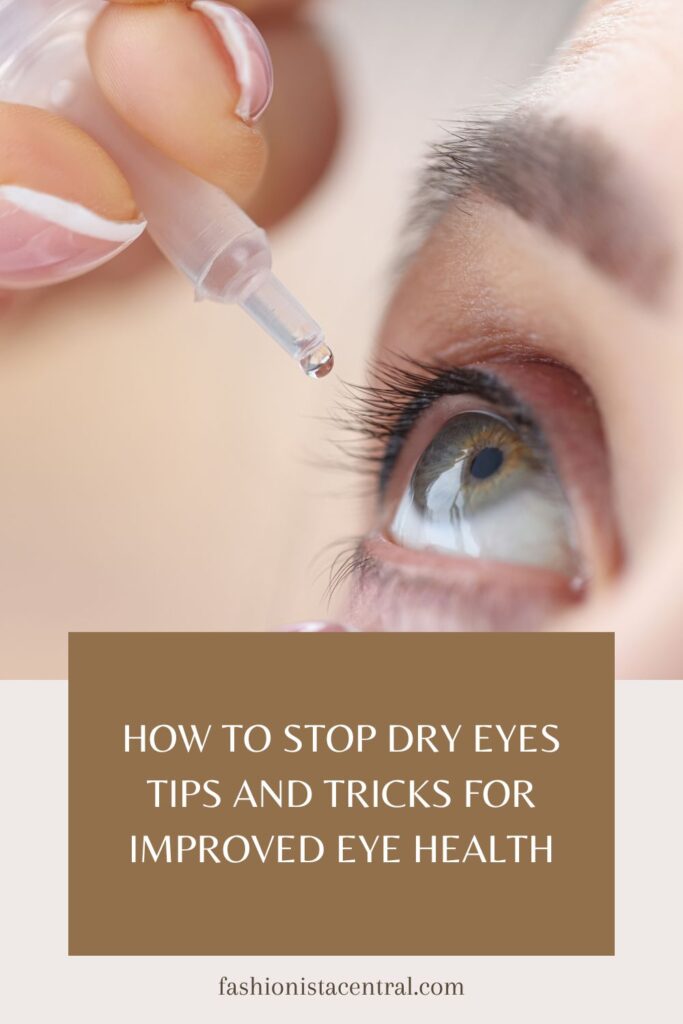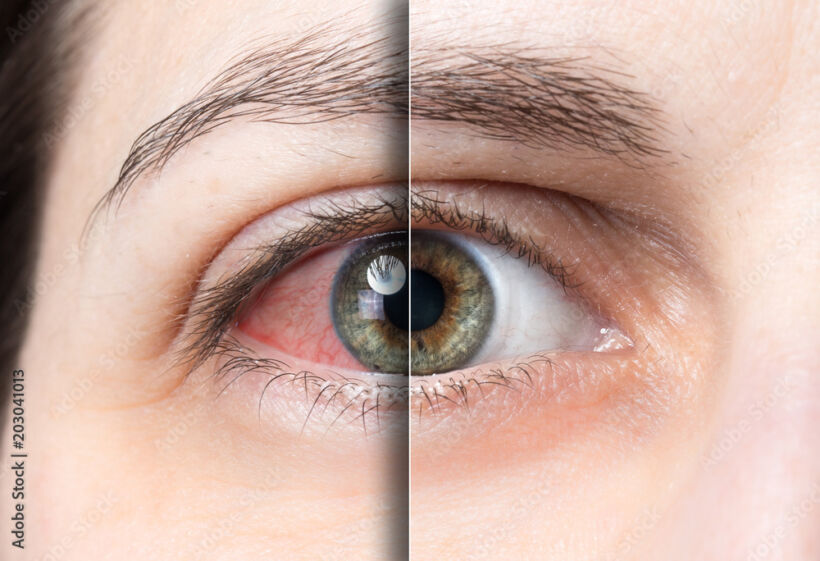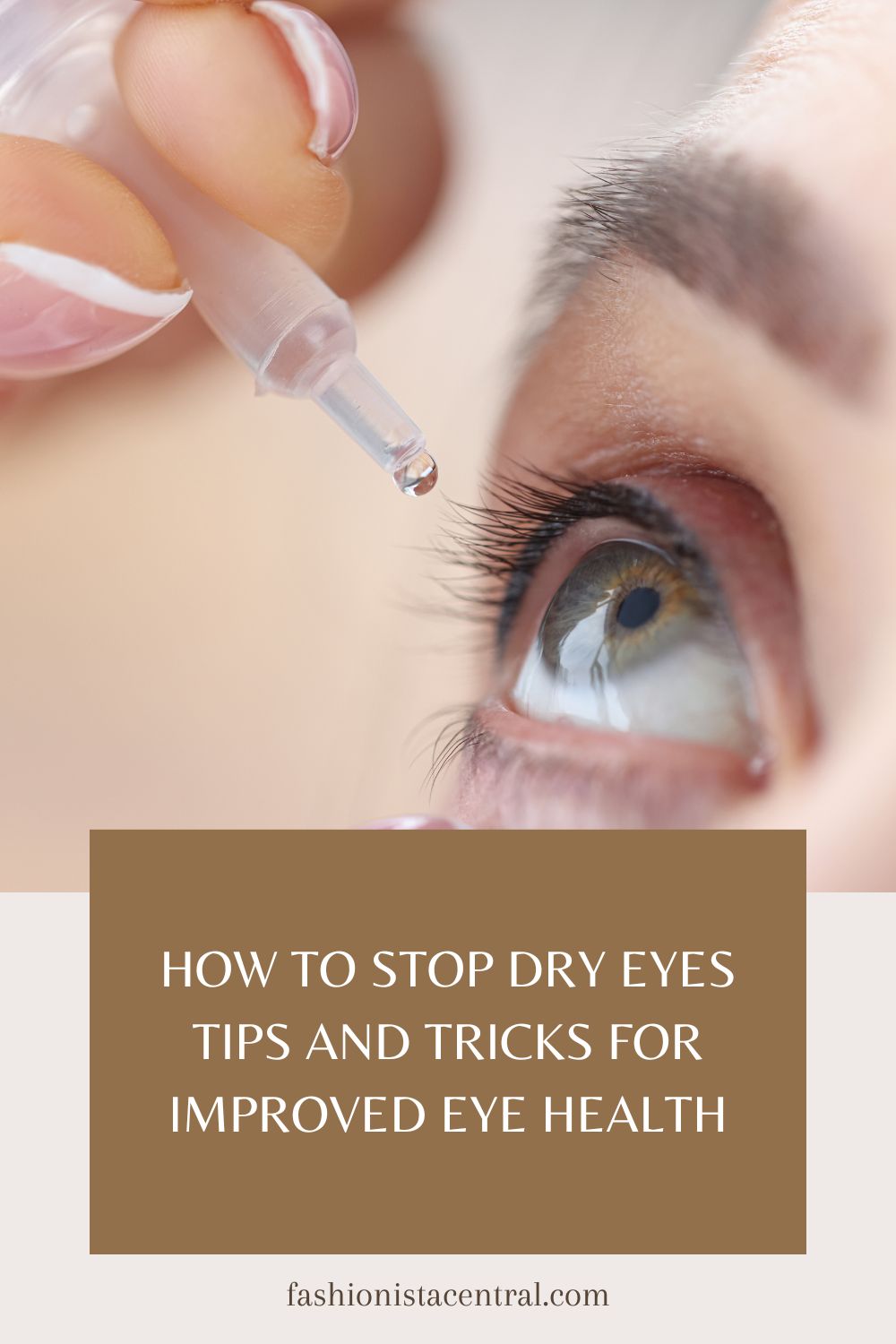
Have you ever experienced that uncomfortable feeling of having dry, itchy, or irritated eyes? It’s a common condition that occurs when your eyes don’t produce enough tears or when the tears evaporate too quickly. Dry eyes can be caused by various factors such as aging, medical conditions, certain medications, or environmental factors like air conditioning or dry air.
Having healthy eyes is crucial to maintaining your overall well-being. Your eyes allow you to see and experience the world around you, and taking care of them is essential. If left untreated, dry eyes can lead to more severe complications like eye infections or even vision loss.
The good news is that there are several things you can do to prevent or alleviate dry eyes. From simple lifestyle changes to medical treatments, we’ve got you covered. So if you’re tired of dealing with dry eyes and want to improve your eye health, keep reading to learn more.
Causes of Dry Eyes
Dry eyes can occur for a variety of reasons. In this section, we will explore some of the most common causes of dry eyes.
A. Environmental factors

The environment around you can play a significant role in causing dry eyes. Some common environmental factors include:
- Windy or dry climate – People who live in areas with low humidity or dry, windy climates are more likely to experience dry eyes.
- Air conditioning or heating – Air conditioning or heating units can also dry out the air and cause dry eyes.
- Pollution – Environmental pollution, including smoke, dust, and chemicals, can irritate the eyes and cause them to become dry.
- Screen time – Spending long hours looking at screens can cause dry eyes due to reduced blinking.
B. Medical conditions

Certain medical conditions can also cause dry eyes. Some of these conditions include:
- Sjogren’s syndrome – This autoimmune disorder can affect the eyes and cause dryness.
- Rheumatoid arthritis – People with rheumatoid arthritis are more likely to experience dry eyes.
- Diabetes – High blood sugar levels can cause dry eyes.
- Thyroid disorders – An overactive or underactive thyroid can cause dry eyes.
C. Medications

Certain medications can cause dry eyes as a side effect. Some of these medications include:
- Antihistamines – Antihistamines used to treat allergies can cause dry eyes.
- Antidepressants – Certain antidepressants can also cause dry eyes.
- Diuretics – These medications, also known as water pills, can cause dehydration and lead to dry eyes.
D. Age-related factors

As we age, our bodies produce fewer tears, which can lead to dry eyes. Other age-related factors that can contribute to dry eyes include:
- Menopause – Women going through menopause are more likely to experience dry eyes.
- Hormonal changes – Changes in hormones can cause dry eyes in both men and women.
- Eye surgery – Certain eye surgeries, such as LASIK, can cause temporary dry eyes.
Dry eyes can have various causes, including environmental factors, medical conditions, medications, and age-related factors. By understanding the causes of dry eyes, you can take steps to prevent or manage this condition and maintain good eye health.
Symptoms of Dry Eyes

Dry eyes can cause a range of symptoms that can be quite uncomfortable. Understanding the symptoms associated with dry eyes is the first step in addressing the condition. Here are the most common symptoms of dry eyes:
- Itchiness: One of the most common symptoms of dry eyes is itchiness. Itchiness can be caused by the dryness of the eye surface, which leads to a buildup of bacteria and debris.
- Redness: Redness is another common symptom of dry eyes. It is caused by inflammation of the eye’s surface due to a lack of lubrication.
- Sensitivity to Light: Dry eyes can make you more sensitive to light. This can make it difficult to perform everyday activities such as reading, driving or working on the computer.
- Blurry Vision: Dry eyes can also cause blurry vision. The tear film helps to keep the eye’s surface smooth and clear, and without enough lubrication, the vision can become blurred.
If you experience any of these symptoms, it’s important to consult an eye doctor or specialist to determine the underlying cause and develop an appropriate treatment plan.
Tips and Tricks for Preventing Dry Eyes

Dry eyes can be a real pain to deal with, but luckily there are several things you can do to prevent them. Here are some tips and tricks to help you maintain good eye health and avoid dry eyes:
A. Blinking exercises
Believe it or not, blinking exercises can help prevent dry eyes. When we stare at screens for extended periods of time, we tend to blink less, which can cause our eyes to dry out. Blinking exercises help increase the frequency of our blinks and keep our eyes lubricated.
To perform a blinking exercise, simply close your eyes and count to two. Then, open them and repeat the process ten times. Do this exercise at least once every hour to keep your eyes from getting too dry.
B. Use of a humidifier
Dry air can cause dry eyes, so using a humidifier can help keep the air in your home or office moist. A humidifier adds moisture to the air, which can prevent your eyes from drying out.
Be sure to clean your humidifier regularly to prevent the growth of bacteria or mold, which can be harmful to your health.
C. Adjusting computer screen settings
The brightness and contrast of your computer screen can contribute to eye strain and dryness. Adjusting your screen’s settings can help prevent these problems.
Make sure your screen’s brightness is adjusted to match the lighting in your room. If you are working in a brightly lit area, increase the brightness of your screen. If you are working in a dimly lit area, decrease the brightness.
Also, adjust the contrast of your screen to reduce glare and make it easier on your eyes.
D. Avoiding cigarette smoke and other irritants
Cigarette smoke and other irritants can cause dry eyes, so it’s important to avoid them whenever possible. If you are a smoker, consider quitting to improve your overall health and reduce your risk of dry eyes.
In addition to cigarette smoke, other irritants that can cause dry eyes include air pollution, dust, and wind. If you are going to be in a windy or dusty environment, consider wearing goggles or other protective eyewear to prevent dryness and irritation.
Dry eyes can be a nuisance, but they are preventable. By incorporating these tips and tricks into your daily routine, you can keep your eyes healthy and prevent dryness and discomfort. Remember to blink often, use a humidifier, adjust your computer screen settings, and avoid cigarette smoke and other irritants.
Home Remedies for Dry Eyes
Dry eyes can be a frustrating and uncomfortable condition to deal with, but luckily, there are some home remedies that can help alleviate the symptoms. Here are some tips and tricks that you can use to manage dry eyes at home.
A. Warm compresses
Applying a warm compress to your eyes can help stimulate the glands that produce tears and reduce inflammation. To do this, simply soak a clean towel in warm water and wring out the excess. Then, place the towel over your closed eyes for 10-15 minutes. Repeat this process as needed throughout the day.
B. Eye massages
Massaging the area around your eyes can also help stimulate tear production and reduce eye strain. Use your fingers to gently massage your eyelids and the surrounding areas in a circular motion. Be careful not to press too hard or rub too vigorously, as this can irritate your eyes further.
C. Omega-3 supplements
Omega-3 fatty acids are known to have anti-inflammatory properties and can help reduce dry eye symptoms. You can find omega-3 supplements at most health food stores, or you can add more omega-3 rich foods to your diet, such as salmon, tuna, and flaxseed.
D. Using eye drops
Eye drops can be a quick and easy way to relieve dry eyes. There are many different types of eye drops available, so it’s important to choose the right one for your needs. Look for eye drops that are specifically designed for dry eyes and avoid those that contain preservatives, as these can irritate your eyes.
By incorporating these home remedies into your daily routine, you can help reduce the discomfort associated with dry eyes and improve your overall eye health. With consistent effort and patience, you can start to feel the benefits of these remedies and stop dry eyes from interfering with your daily life.
Remember, while these home remedies can help manage dry eyes, it’s important to see a doctor if your symptoms persist or worsen over time. Your doctor can help determine the underlying cause of your dry eyes and recommend further treatment options to help you find relief.
Over-the-Counter Treatments for Dry Eyes
Dry eyes can be a persistent and uncomfortable problem that affects many people. While there are several natural remedies and lifestyle changes that can help prevent and manage dry eyes, there are also over-the-counter treatments available to relieve the symptoms of dry eyes.
A. Artificial tears
Artificial tears are a common and effective over-the-counter treatment for dry eyes. These eye drops work by lubricating the surface of the eyes and providing temporary relief from dryness, itchiness, and irritation. There are several types of artificial tears available, including those that are preservative-free and those that contain preservatives. It is important to choose the right type of artificial tears based on the severity of your dry eyes and any other eye conditions you may have.
B. Eye ointments
Eye ointments are another over-the-counter treatment for dry eyes. These products are thicker and longer-lasting than artificial tears and are designed to provide prolonged relief from dryness and irritation. Eye ointments can be particularly helpful for people who experience dry eyes at night, as they can provide lubrication throughout the night.
C. Eye gels
Eye gels are similar to eye ointments in that they are thicker than artificial tears and provide prolonged relief. However, they are not as thick as ointments and are easier to apply. Eye gels are particularly useful for people who experience moderate to severe dry eyes, as they can provide longer-lasting relief than artificial tears.
D. Prescription eye drops
For people with more severe cases of dry eyes, prescription eye drops may be necessary. These drops are typically more potent than over-the-counter options and are designed to reduce inflammation and increase tear production. Prescription eye drops are only available with a doctor’s prescription and should be used under medical supervision.
Over-the-counter treatments can be a useful tool for managing the symptoms of dry eyes. However, it is important to choose the right treatment based on the severity of your symptoms and any other eye conditions you may have. If your symptoms persist or worsen, it is important to consult with an eye doctor to determine the best course of treatment. By taking proactive steps to manage dry eyes, you can improve your eye health and quality of life.
Also Read: Stress Breakouts: Understanding the Link Between Your Mind and Your Skin
Lifestyle Changes to Improve Eye Health
If you are suffering from dry eyes, there are several lifestyle changes you can make to improve your eye health. These changes include eating a healthy diet, getting regular exercise, quitting smoking, and protecting your eyes from the sun.
A. Eating a healthy diet
Eating a healthy diet is essential for overall health and well-being, and it can also help improve eye health. Here are some tips for a healthy diet that can help stop dry eyes and improve eye health:
Incorporate omega-3 fatty acids into your diet: Foods rich in omega-3 fatty acids, such as salmon, tuna, and flaxseed, can help reduce inflammation in the body, which can contribute to dry eyes.
Eat plenty of fruits and vegetables: Fruits and vegetables are rich in vitamins and antioxidants that can help protect your eyes from damage.
Avoid processed and sugary foods: Processed and sugary foods can contribute to inflammation in the body, which can worsen dry eyes.
B. Getting regular exercise
Regular exercise is not only good for your overall health, but it can also improve eye health. Exercise can help improve blood flow to the eyes, which can help prevent dry eyes. Here are some tips for incorporating exercise into your routine:
Aim for 30 minutes of exercise per day: This can include brisk walking, jogging, cycling, or swimming.
Take breaks if you work on a computer all day: Staring at a computer screen for long periods can cause eye strain and dry eyes. Taking breaks to walk around and stretch can help prevent this.
C. Quitting smoking
Smoking is not only bad for your lungs, but it can also contribute to dry eyes. Smoke irritates the eyes and can cause inflammation, which can worsen dry eyes. If you smoke, quitting can improve your overall health and improve your eye health.
D. Protecting your eyes from the sun
The sun’s ultraviolet (UV) rays can damage your eyes and contribute to dry eyes. Here are some tips for protecting your eyes from the sun:
Wear sunglasses that block UV rays: Look for sunglasses that block 99% to 100% of both UVA and UVB rays.
Wear a hat: Wearing a hat with a brim can also help protect your eyes from the sun.
By making these lifestyle changes, you can improve your overall health and stop dry eyes from interfering with your daily life.
Conclusion
Taking care of your eyes is crucial for maintaining good vision and overall wellbeing. Dry eyes can be uncomfortable and frustrating, but with the right measures, they can be prevented and treated effectively.
To stop dry eyes and improve your eye health, here are some tips and tricks to keep in mind:
- Stay hydrated by drinking plenty of water
- Take frequent breaks when using digital screens and use the 20-20-20 rule
- Blink regularly and do blinking exercises
- Adjust your computer screen settings to reduce glare and brightness
- Use a humidifier to add moisture to the air
- Avoid cigarette smoke and other irritants
Home remedies like warm compresses, eye massages, and Omega-3 supplements can also help alleviate dry eyes. Over-the-counter treatments like artificial tears, eye ointments, and eye gels are also available. However, it’s important to consult with your doctor before using any medication.
Making lifestyle changes such as eating a healthy diet, getting regular exercise, quitting smoking, and protecting your eyes from the sun can also improve your eye health.
If your symptoms persist, seek medical attention. Your eye doctor can provide a proper diagnosis and recommend the appropriate treatment.
Taking care of your eyes is an essential part of maintaining a healthy lifestyle. By following the tips and tricks mentioned above, you can prevent and alleviate dry eyes, and ultimately improve your eye health. Remember to prioritize your eye health and visit your eye doctor regularly to ensure the best possible care for your eyes.

